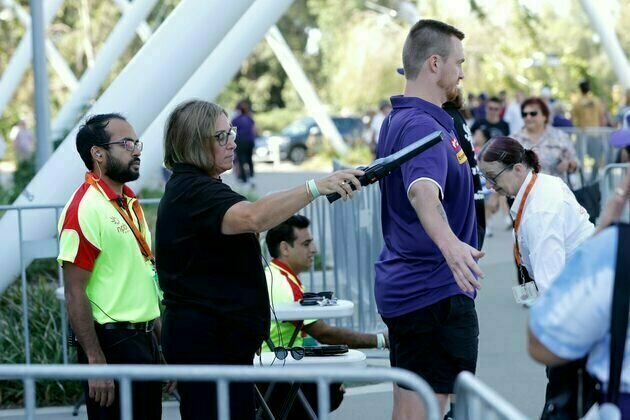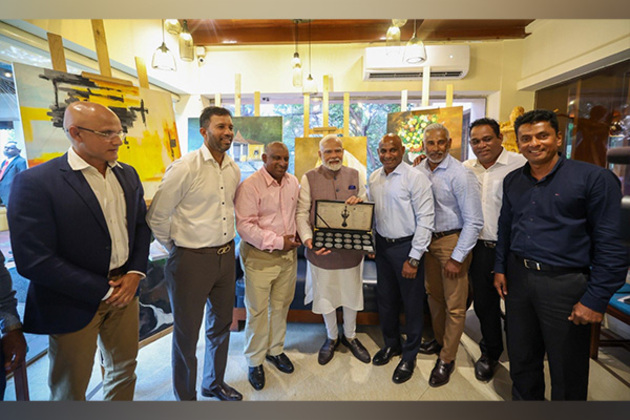Do we need a Martyn's Law for venue security in Australia? The MCG gun scare is a wake-up call
The Conversation
07 Apr 2025, 01:45 GMT+10

Two men were arrested for allegedly bringing loaded firearms into the Melbourne Cricket Ground (MCG) during Thursday's AFL match between Collingwood and Carlton.
The incident didn't result in harm but it triggered serious questions about venue security processes in Australia.
The MCG had recently adopted AI-powered security screening systems, designed to detect weapons while streamlining crowd flow.
The scanners reportedly flagged the men's belongings but a failure in the follow-up manual check allowed them to enter.
The event has reignited a national conversation about the right level of security at major venues. How do we balance the need for thorough screening with the goal of maintaining smooth ingress, individual freedom and public comfort?
The timing is notable. Just days earlier, the UK passed Martyn's Law, which introduces a legal duty for venues to assess and mitigate terrorism risks.
The passage of this legislation prompts a broader question for Australia: should international developments like this influence how we think about security preparedness?
The MCG recently contracted Evolv Technology, a US-based company, to supply AI-powered security screening systems for its major events.
Their system is designed to detect weapons using a combination of sensors, millimetre wave technology and artificial intelligence, rather than relying on traditional metal detection.
Evolv claims the system allows people to flow into the stadium faster compared to older technologies.
Unlike traditional metal detectors, which operate on a simple binary system - alerting whenever metal is present - these scanners claim to offer a more granular assessment of objects.
Instead of flagging all metal indiscriminately, the system is meant to evaluate the shape, size and density of objects to distinguish between benign items (such as keys or belts) and potential threats like firearms or large knives.
This means patrons can pass through without removing metal items from their clothing or bags, significantly reducing wait times.
When an item of interest is detected, the system highlights the specific area of the body or bag where it is located. This enables security staff to conduct a targeted search and avoid the need for a full-body inspections using hand-held detectors.
Investigations and independent tests overseas have, however, identified false positives and missed detections as potential weaknesses in the Evolv system. One report found the system failed to detect certain knives and even some firearms in school settings.
The risk associated with missed detection is self-explanatory: prohibited items can slip through the screening.
But a high rate of false positives can also present challenges, particularly at the manual inspection stage, where staff are required to follow up on each alert. Over time, this can increase the likelihood of human error due to fatigue, reduced vigilance, or assumptions that flagged items are benign.
So while AI scanners may be faster, they still depend heavily on the effectiveness of secondary manual screening and appropriate training of personnel. In the MCG breach, it is reported the scanners flagged items of concern when the two men entered the venue but the threat was missed during the manual follow-up process.
The MCG breach exposed a gap in security that could, in other circumstances, be exploited with far more serious consequences.
Public venues such as stadiums, especially during major events, are known to be targets for those planning high-impact attacks.
Australia's Strategy for Protecting Crowded Places from Terrorism explicitly lists stadiums and arenas as high-risk environments due to their crowd density, symbolic value and open access points.
International experience reflects this concern. In the months leading up to the 2024 Paris Olympics, French authorities disrupted several planned attacks targeting Olympic-related venues and gatherings.
As security practices evolve and new technologies are introduced, a parallel question is emerging: what should the legal expectations be for public venue operators when it comes to threat preparedness?
In the United Kingdom, this question has led to Martyn's Law - a major piece of legislation just passed by the parliament.
The law was introduced in response to the 2017 Manchester Arena bombing, when 22 people were killed in a terrorist attack. One of the victims was Martyn Hett, whose mother, Figen Murray, campaigned for stronger, legally binding safety obligations for public venues.
After six years of advocacy, the legislation was passed a few days ago.
Martyn's Law introduces a legal duty for UK venues to assess and mitigate terrorism risks. Depending on the size and type of venue, this includes measures such as conducting risk assessments, training staff and developing clear emergency response plans.
Australia already has detailed guidance for the protection of crowded places. But unlike Martyn's Law, that guidance is not a legal mandate.
Long security queues can frustrate patrons and dampen crowd mood. It's no surprise venues are adopting AI-based screening to ease entry.
But emerging technologies have limits and vulnerabilities may only surface once they're in use.
From a safety perspective, the best-case scenario is for these weaknesses to be revealed without harm, which can strengthen systems before a real failure occurs.
The recent breach serves as just that: a prompt for review without consequence.
These tools don't replace trained personnel. Their success depends on clear procedures and defined responsibilities.
That's where legislation like the UK's Martyn's Law becomes relevant: turning good practice into legal obligation.
As Australia prepares for global events, this is a chance to consider the governance that supports venue security.
The presence of a legislative framework could serve as part of our overall security posture. And that, in itself, can help deter or mitigate risk.
 Share
Share
 Tweet
Tweet
 Share
Share
 Flip
Flip
 Email
Email
Watch latest videos
Subscribe and Follow
Get a daily dose of Brisbane Star news through our daily email, its complimentary and keeps you fully up to date with world and business news as well.
News RELEASES
Publish news of your business, community or sports group, personnel appointments, major event and more by submitting a news release to Brisbane Star.
More InformationAustralia
SectionDo we need a Martyn's Law for venue security in Australia? The MCG gun scare is a wake-up call
Two men were arrested for allegedly bringing loaded firearms into the Melbourne Cricket Ground (MCG) during Thursday's AFL match between...
98% of Queensland prawn areas at risk of inundation by rising seas this century
As climate change wreaks havoc with the world's oceans, future production of fish, crustaceans and other aquatic organisms is under...
Halle Berry shares how Chris Hemsworth "stood by her" on the set of 'Crime 101'
Washington DC [US], April 6 (ANI): Actress Halle Berry, while promoting her crime thriller 'Crime 101' at CinemaCon in Las Vegas, opened...
Sri Lankan cricketer Jayasuriya seeks PM Modi's help in bringing international cricket to Jaffna
Colombo [Sri Lanka], April 6 (ANI): During his recent visit to Sri Lanka, Prime Minister Narendra Modi met with the island country's...
(SP)JAPAN-SUZUKA-F1-GRAND PRIX-RACE
(250406) -- SUZUKA, April 6, 2025 (Xinhua) -- Red Bull Racing's Dutch driver Max Verstappen competes during the Formula One Japanese...
Diksha, Pranavi make cut in rain-hit Joburg Ladies Open
Johannesburg [South Africa], April 6 (ANI): Golfer Pranavi Urs faltered in the second round at the weather-hot Joburg Ladies Open but...
International
SectionMore than 400 aid workers killed in Gaza since October 7 2023
NEW YORK, New York - UN Secretary-General Antonio Guterres has voiced profound concern over the escalating human toll in Gaza, as...
Billionaire Kretinsky clears final hurdle in Royal Mail takeover
LONDON, U.K.: Daniel Kretinsky's path to owning Royal Mail is nearly complete, as his firm EP Group announced this week that all regulatory...
AP study: MLB average salary hits $5 million for first time
NEW YORK CITY, New York: Major League Baseball (MLB) players now earn an average of over US$5 million per year for the first time,...
Former coal plant to become $10 billion data center for AI, Cloud
HARRISBURG, Pennsylvania: The owners of Pennsylvania's largest former coal power plant plan to turn it into a US$10 billion natural...
Head Start administration staff placed on leave amid disruptions
WASHINGTON, D.C.: Many government workers who help run Head Start, a federally funded preschool program, have been put on leave. The...
Pre-tariff inventory gives car dealers a competitive edge
LONDON/DETROIT: As U.S. automakers brace for the financial impact of new 25 percent tariffs, car dealers with inventory built before...












